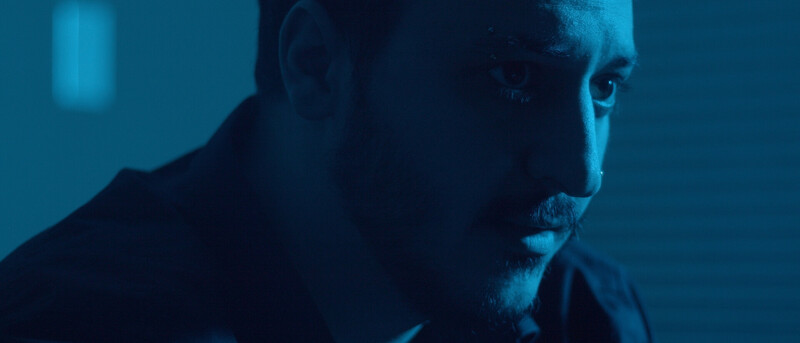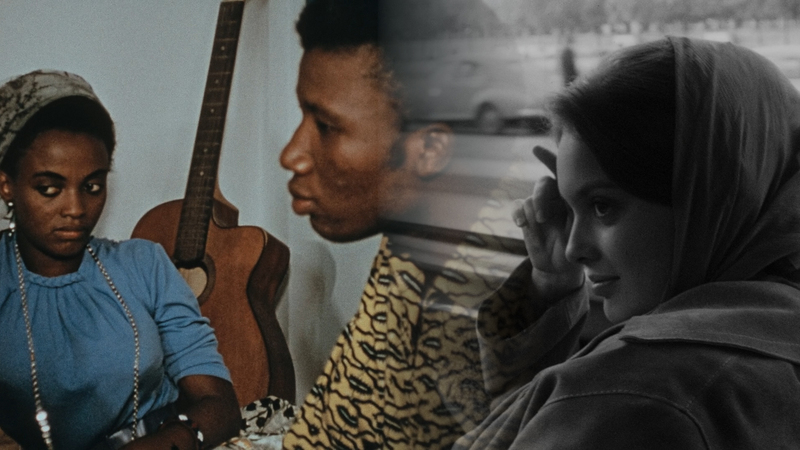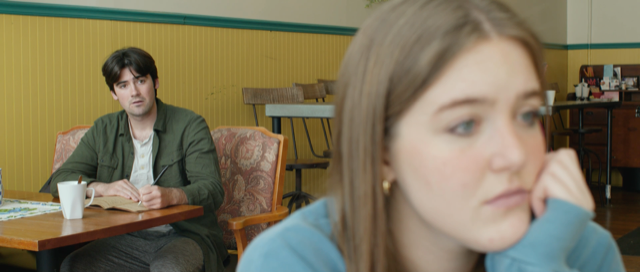
A Haunting Dive Into the Unconscious Mind
MOVIE REVIEW
Protanopia
–
Genre: Drama, Horror
Year Released: 2024
Runtime: 1h 15m
Director(s): Matthew Mahler
Writer(s): Matthew Mahler
Cast: Timothy J. Cox, Anthony Carey, Paula Mahler, John Heerlein, James Chase, Ross Mahler, John Mahler, Barbara Mahler, Matthew Mahler, Andrea Norell
Where to Watch: TBD
RAVING REVIEW: What begins as a search for a missing sister quickly spirals into a chaotic tale of horror where the very fabric of reality unravels in unexpected ways. PROTANOPIA is a project that doesn’t just ask for your attention—it demands your surrender. Director Matthew Mahler crafts an experience that favors mood over clarity and experimentation over convention. While that may satisfy viewers who enjoy films that challenge their perceptions, it may alienate those seeking a clearer path.
The story splits its focus between Luke, played by Anthony Carey, and Alan Roscoe Jr., portrayed by Timothy J. Cox. Luke is consumed with the disappearance of his sister, and that desperation begins to seep into his subconscious, manifesting in unsettling dreams. In an overlap, those dreams center on a peculiar house that Alan recently inherited from his deceased father. Alan, now reluctantly serving as the head of his neighborhood’s homeowners’ association, finds himself at odds with a fellow member, Janice, played by Paula Mahler. Their confrontations add an odd but intriguing commentary on power struggles in communities.
As both men begin to unravel, their realities seem to intersect. What’s presented as two separate journeys morphs into something more abstract, suggesting a shared psychological space or even a blending of experiences. Mahler avoids traditional exposition, instead leaning heavily on visuals to convey emotion and progression. The film's aesthetic design is central to its identity—saturated colors, flashing lights, and deliberate distortions pulse with intent, reflecting the characters' internal breakdown.
But while those stylistic choices are often compelling, they highlight the film’s limitations. The overuse of visual effects, particularly strobe lighting and repetitive imagery, threatens to overwhelm the narrative. In some sequences, it’s hard to tell whether the film is attempting to be immersive or simply confrontational. It's an ambitious artistic decision that risks pushing viewers away instead of pulling them in.
To its credit, PROTANOPIA doesn't rely on gore or traditional horror tropes to provoke a reaction. Instead, it builds tension through discomfort, long takes, uncomfortable silences, and an audio design that claws at the edge of your nerves. The soundscape, easily one of the film’s strongest assets, creates a sense of unease that never quite settles.
Cox's portrayal of Alan walks a line between hapless and sinister, from his quiet awkwardness to his unhinged moments. Carey’s Luke, by contrast, acts more as an anchor to the story (as much as there can be one.) His search for meaning—whether in dreams, conversations with friends, or imagined moments with his sister—grounds the film, even when the structure floats into abstraction.
Mahler’s Janice brings a different kind of energy to the screen. She feels plucked straight from real life: the figure with too much time and a vendetta to prove. Her dynamic with Alan adds a layer of satire, poking at the absurdity of bureaucracy and the illusion of authority in suburban life. While it’s occasionally played for humor, the underlying tension adds texture to what could’ve otherwise been a one-note character.
PROTANOPIA struggles most in its refusal to offer the audience even a loose map. Surrealism can work beautifully when it feels purposeful, but much of the confusion here seems unintentional. There are stretches of the film where the structure breaks down so completely that any emotional or narrative investment begins to waver. When a film asks this much of its audience, it has to provide more than mood and style—it needs escalation, or at the very least, an emotional throughline that rewards engagement.
At times, the film seems more interested in puzzling than purpose. It raises questions but offers little closure, and for viewers who invest in the setup, that lack of resolution might feel like a missed opportunity. There's an effort to imply broader themes—greed, masculinity, and repression—but they remain hazy and underexplored, hidden beneath the visual noise.
Ultimately, PROTANOPIA is the kind of film that gets talked about because it struck a chord or left viewers scratching their heads. It doesn’t walk a traditional path, and it deserves some recognition for that alone. Whether it works as a complete piece is another question. The ambition and the craft behind many technical elements are undeniable. But without a stronger path to follow, the experience feels more like an experiment than a fully realized story. This is a film built on atmosphere, tone, and disorientation. It’s loud, strange, memorable, murky, and emotionally distant.
Please visit https://linktr.ee/overlyhonestr for more reviews.
You can follow me on Letterboxd, Instagram, Twitter, and YouTube. My social media accounts can also be found on most platforms by searching Overly Honest Reviews.
I’m always happy to hear from my readers; please say hi or send me any questions about movies.
[photo courtesy of 8MM FILMS]
DISCLAIMER:
At Overly Honest Movie Reviews, we value honesty and transparency. Occasionally, we receive free items for review, including DVDs, Blu-rays, CDs, Vinyl, Books, etc. We assure you that these arrangements do not influence our reviews, as we are committed to providing unbiased and sincere evaluations. We aim to help you make informed entertainment choices regardless of our relationship with distributors or producers.
Amazon Affiliate Links:
Additionally, this site contains Amazon affiliate links. If you purchase through these links, we may receive a commission. This affiliate arrangement does not affect our commitment to honest reviews and helps support our site. We appreciate your trust and support in navigating these links.



Average Rating